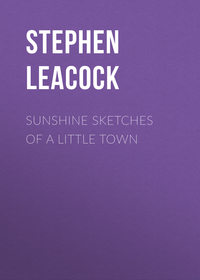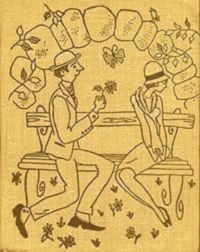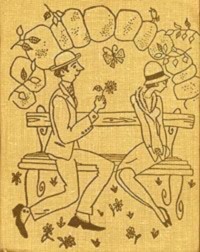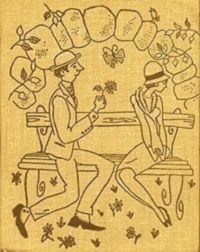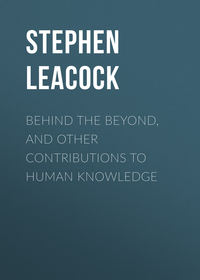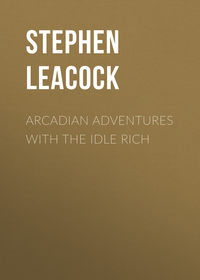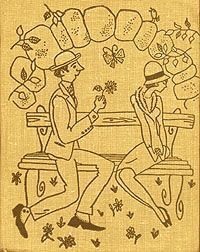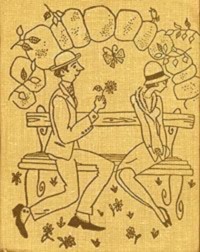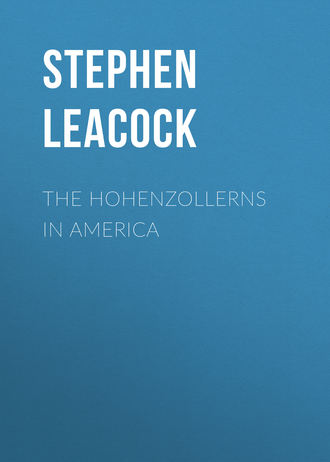 полная версия
полная версияThe Hohenzollerns in America
Wednesday
This morning we had a great disappointment. It had been pretty well arranged on board the ship that Uncle would take over the presidency of Harvard University. Uncle Henry and Cousin Ferdinand and Cousin Willie had all consented to it, and we looked upon it as done. Now it seems there is a mistake. First of all Harvard University is not in New York, as we had always thought in Germany that it was. I remember that when Uncle Henry came home from his great tour in America, in which he studied American institutions so profoundly, and made his report he said that Harvard University was in New York. Uncle had this information filed away in our Secret Service Department.
But it seems that it is somewhere else. The University here is called Columbia, so Uncle decided that he would be president of that. In the old days all the great men of learning used to assure Uncle that if fate had not made him an emperor he would have been better fitted than any living man to be the head of a great university. Uncle admitted this himself, though he resented being compared only to the living ones.
So it was a great disappointment to-day when they refused to give him the presidency. I went with him to the college, but I cannot quite understand what happened or why they won't give it to him. We walked all the way up and I carried a handbag filled with Uncle's degrees and diplomas from Oxford and all over the world. All the way up Uncle talked about the majesty and the freedom of learning and what he would do to the college when he was made president, and how all the professors should sit up and obey him. At times he got so excited that he would stop on the street and wave his hands and gesticulate so that people turned and looked at him. At Potsdam we never realized that Uncle was excited all the time, and, in any case, with his uniform on and his sabre clattering as he walked, it all seemed different. But here in the street, in his faded frock coat and knitted tie, and with his face flushed and his eyes rambling, people seemed to mistake it and thought that his mind was not quite right.
So I think he made a wrong impression when we went into the offices of the college. Uncle was still quite excited from his talking. "Let the trustees be brought," he said in a peremptory way to the two young men in black frock coats, secretaries of some sort, I suppose, who received us. Then he turned to me. "Princess," he said, "my diplomas!" He began pulling them out of the bag and throwing them on the table in a wild sort of way. The other people waiting in the room were all staring at him. Then the young men took Uncle by the arm and led him into an inner room and I went out into the corridor and waited. Presently one of the young men came out and told me not to wait, as Uncle had been sent home in a cab. He was very civil and showed me where to go to get the elevated railroad. But while I was waiting I had overheard some of the people talking about Uncle. One said, "That's that same old German that was on board our ship last week in the steerage—has megalomania or something of the sort, they say, and thinks he's the former Emperor: I saw the Kaiser once at a review in Berlin,—not much resemblance, is there?"
CHAPTER III
For weeks and weeks I have written nothing in my diary because it has been so discouraging. After Uncle William's offer to take over the presidency of Columbia University had been refused, he debated with Uncle Henry and with Cousin Ferdinand of Bulgaria (who is not living in our boarding house now but who comes over quite often in the evenings) whether he would accept the presidency of Harvard. Cousin Ferdinand looked up the salary in a book and told him not to take it. Cousin Ferdinand has little books with all the salaries of people in America and he says that these books are fine and much better than the Almanach de Gotha which we used to use in Europe to hunt people up. He says that if he ever goes back to be King of Bulgaria again he is going to introduce books like these. Cousin Ferdinand is getting very full of American ideas and he says that what you want to know about a man is not his line of descent but his line of credit. And he says that the whole King business in Europe has been mismanaged. He says that there should have been millions in it. I forgot to say in my diary sooner that Cousin Ferdinand's two friends, Mr. Mosenhammer and Mr. Sheehan, took him into their clothing business at once as a sort of partner. The reason was that they found that he could wear clothes; the effect on the customers when they see Cousin Ferdinand walking up and down in front of the store is wonderful. Of course all kings can wear clothes and in the old days in the Potsdam palace we thought nothing of it. But Cousin Ferdinand says that the kings should have known enough to stop trying to be soldiers and to put themselves at the head of the export clothing trade. He wishes, he says, that he had some of his Bulgarian generals here now in their blue coats trimmed with black fur; he says that with a little alteration, which he showed us how to do, he could have sent them out "on the road," wherever that is, and have made the biggest boom in gentlemen's winter fur trimmings that the trade ever saw.
Cousin Ferdinand, when he comes over in the evenings now, is always beautifully dressed and I can notice that Mrs. O'Halloran, the landlady, is much impressed with him. I am glad of this because we have not yet been able to pay her any money and I was afraid she might say something about it. But what is stranger is that now that Cousin Ferdinand has good clothes, Uncle William and Uncle Henry seem much impressed too. Uncle Henry looks so plain and common in his sailor's jersey, and Uncle William in his old frock coat looks faded and shabby and his face always vacant and wondering. So now when Cousin Ferdinand comes in they stand up and get a chair for him and listen to his advice on everything.
So, as I said, Cousin Ferdinand looked up the salary of the President of Harvard in a book and he was strongly against Uncle William's taking the position. But Uncle William says this kind of position is the nearest thing in this country to what he had in Germany. He thinks that he could do for Harvard what he did for Germany. He has written out on a big sheet of paper all the things that he calls the Chief Needs of America, because he is always busy like this and never still. I forget the whole list, especially as he changes it every day according to the way that people treat Uncle William on the street, but the things that he always puts first are Culture, Religion, and Light. These he says he can supply, and he thought that the presidency of Harvard would be the best place to do it from. In the end he accepted the position against Cousin Ferdinand's advice, or at least I mean he said that he would be willing to take it and he told Uncle Henry to pack up all his degrees and diplomas and to send them to Harvard and say that he was coming.
So it was dreadfully disappointing when all the diplomas came back again by the next post. There was a letter with them but I didn't see it, as Uncle William tore it into fragments and stamped on it. He said he was done with American universities for ever: I have never seen him so furious: he named over on his fingers all the American professors that he had fed at Berlin, one meal each and sometimes even two,—Uncle has a wonderful memory for things like that,—and yet this was their gratitude. He walked up and down his room and talked so wildly and incoherently that if I had not known and been told so often by our greatest authorities in Germany how beautifully balanced Uncle William's brain is, I should have feared that he was wandering.
But presently he quieted down and said with deep earnestness that the American universities must now go to ruin in their own way. He was done with them. He said he would go into a cloister and spend his life in quiet adoration, provided that he could find anything to adore, which, he said, in his station was very doubtful. But half an hour later he was quite cheerful again,—it is wonderful how quickly Uncle William's brain recovers itself,—and said that a cloister was too quiet and that he would take a position as Governor of a State; there are a great many of these in this country and Uncle spent days and days writing letters to them and when the answers came in— though some never answered at all—Uncle William got into the same state of fury as about the Presidency of Harvard. So, naturally, each day seemed more disappointing than the last, especially with the trouble that we have been having with Cousin Willie, of which I have not spoken yet, and I was getting quite disheartened until last evening, when everything seemed to change.
We all knew, of course, that Uncle William is the greatest artist in the world, but no one liked to suggest that he should sell his pictures for money, a thing that no prince was ever capable of doing. Yet I could not but feel glad when Uncle decided yesterday that he would stoop to make his living by art. It cost him a great struggle to make this decision, but he talked it over very fully last night with Uncle Henry, after Uncle Henry came home from work, and the resolution is taken.
Of course, Uncle always had a wonderful genius for painting. I remember how much his pictures used to be admired at the court at Berlin. I have seen some of the best painters stand absolutely entranced,—they said so themselves,—in front of Uncle's canvasses. I remember one of the greatest of our artists saying one day to Uncle in the Potsdam Gallery, "Now, which of these two pictures is yours and which is Michel Angelo's: I never can tell you two apart." Uncle gave him the order of the Red Swan. Another painter once said that if Uncle's genius had been developed he would have been the greatest painter of modern times. Uncle William, I remember, was dreadfully angry. He said it WAS developed.
So it seemed only natural that Uncle should turn to Art to make our living. But he hesitated because there is some doubt whether a person of noble birth can sell anything for money. But Uncle says Tintoretto the great Italian artist had two quarterings of nobility, and Velasquez had two and a half.
Luckily we have with us among our things Uncle's easel and his paints that he used in Berlin. He had always to have special things because he doesn't use little brushes and tubes of colour as ordinary artists do, but had a big brush and his paint in a tin can, so that he can work more quickly. Fortunately we have with us three of Uncle's pictures rolled up in the bottom of our boxes. He is going to sell these first and after that he says that he will paint one or two every day. One of the three canvasses that we have is an allegorical picture called "Progress" in which Progress is seen coming out of a cloud in the background with Uncle William standing in the foreground. Another is called "Modern Science" and in this Science is seen crouched in the dark in the background and Uncle William standing in the light in the foreground. The other is called "Midnight in the Black Forest." Uncle William did it in five minutes with a pot of black paint. They say it is impressionistic.
So all the evening Uncle William and Uncle Henry talked about the new plan. It is wonderful how Uncle William enters into a thing. He got me to fetch him his old blue blouse, which was with the painting things, and he put it on over his clothes and walked up and down the room with a long paint-brush in his hand. "We painters, my dear Henry," he said, "must not be proud. America needs Art. Very good. She shall have it."
I could see, of course, that Uncle William did not like the idea of selling pictures for money. But he is going to make that side of it less objectionable by painting a picture, a very large picture, for nothing and giving it to the big Metropolitan Art Gallery which is here. Uncle has already partly thought it out. It is to be called the "Spirit of America" and in it the Spirit of America will be seen doubled up in the background: Uncle has not yet fully thought out the foreground, but he says he has an idea.
In any case he is going to refuse to take anything more than a modest price for his pictures. Beyond that, he says, not one pfennig.
So this morning Uncle rolled up his three canvasses under his arm and has gone away to sell them.
I am very glad, as we have but little money, indeed hardly any except Uncle Henry's wages. And I have been so worried, too, and surprised since we came here about Cousin Willie. He hardly is with the rest of us at all. He is out all night and sleeps in the day time, and often I am sure that he has been drinking. One morning when he came back to the house at about breakfast time he showed me quite a handful of money, but wouldn't say where he got it. He said there was lots more where it came from. I asked him to give me some to pay Mrs. O'Halloran, but he only laughed in his leering way and said that he needed it all. At another time when I went up to Cousin Willie's room one day when he was out, I saw quite a lot of silver things hidden in a corner of the cupboard. They looked like goblets and silver dinner things, and there was a revolver and a sheath-knife hidden with them. I began to think that he must have stolen all these things, though it seemed impossible for a prince. I have spoken to Uncle William several times about Cousin Willie, but he gets impatient and does not seem to care. Uncle never desires very much to talk of people other than himself. I think it fatigues his mind. In any case, he says that he has done for Willie already all that he could. He says he had him confined to a fortress three times and that four times he refused to have him in his sight for a month, and that twice he banished him to a country estate for six weeks. His duty, he says, is done. I said that I was afraid that Cousin Willie had been stealing and told him about the silver things hidden in the cupboard. But Uncle got very serious and read me a very severe lecture. No prince, he said, ever stole. His son, he explained, might very well be collecting souvenirs as memorials of his residence in America: all the Hohenzollerns collected souvenirs: some of our most beautiful art things at Potsdam and Sans Souci were souvenirs collected by our ancestors in France fifty years ago. Uncle said that if the Great War had turned out as it should and if his soldiers had not betrayed him by getting killed, we should have had more souvenirs than ever. After that he dismissed the subject from his mind. Uncle William can dismiss things from his mind more quickly than anybody I ever knew.
The Same Day. Later
I was so surprised this afternoon, when I happened to go down to the door, to see Mr. Peters, the ice gentleman that was on the ship, with his ice cart delivering ice into the basement. I knew that he delivered ice in this part of the city because he said so, and I think he had mentioned this street, and two or three times I thought I had seen him from the window. But it did seem surprising to happen to go down to the door (I forget what I went for) at the moment that he was there. He looked very fine in his big rough suit of overalls. It is not quite like a military uniform, but I think it looks better. Mr. Peters knew me at once. "Good afternoon, Miss Hohen," he said (that is the name, as I think I said, that we have here), "how are all the folks?"
So we talked for quite a little time, and I told him about Uncle trying to get work and how hard it was and how at last he had got work, or at least had gone out to get it, as a painter. Mr. Peters said that that was fine. He said that painters do well here: he has a lot of friends who are painters and they get all the way from sixty to seventy-five cents an hour. It seems so odd to think of them being paid by the hour. I don't think the court artists at home were paid like that. It will be very nice if Uncle William can mingle with Mr. Peters's artist friends. Mr. Peters asked if he might take me out some Sunday, and I said that I would ask Uncle William and Uncle Henry and Cousin Ferdinand and Cousin Willie and if they all consented to come I would go. I hope it was not a forward thing to do.
I forgot when I was talking of work to say that Uncle Henry got work the very second day that we were here. He works down at the docks where the ships are. I think he supervises the incoming and outgoing of the American navy. It is called being a stevedore, and no doubt his being an Admiral helped him to get it. He hopes to get a certificate presently to be a Barge Master, which will put him in charge of the canals. But there is a very difficult examination to go through and Uncle Henry is working for it at night out of a book. He has to take up Vulgar Fractions which, of course, none of our High Seas Command were asked to learn. But Uncle Henry is stooping to them.
So now, I think, everything will go well.
CHAPTER IV
Uncle's art has failed. It was only yesterday that I was writing in my memoirs of how cheerful and glad I felt to think that Uncle William was going to be able to make his living by art, and now everything is changed again. All the time that Uncle was out on his visit to the picture dealers, I was making plans and thinking what we would do with the money when it came in, so it is very disappointing to have it all come to nothing. I don't know just what happened because Uncle William never gives any details of things. His mind moves too rapidly for that. But he came home with his pictures still under his arm in a perfect fury and raged up and down his room, using very dreadful language.
But after a little while when he grew calmer he explained to me that the Americans are merely swineheads and that art, especially art such as his, is wasted on them. Uncle says that he has no wish to speak harshly of the Americans, but they are pig-dogs. He bears them no ill-will, he says, for what they have done and his heart is free of any spirit of vengeance, but he wishes he had his heel on their necks for about half a minute. He said this with such a strange dreadful snarl that for the moment his face seemed quite changed. But presently when he recovered himself he got quite cheerful again, and said that it was perhaps unseemly in him, as the guest of the American people, to say anything against them. It is strange how Uncle always refers to himself as the guest of the American people. Living in this poor place, in these cheap surroundings, it seems so odd. Often at our meals in the noisy dining-room down in the basement, in the speeches that he makes to the boarders, he talks of himself as the guest of America and he says, "What does America ask in return? Nothing." I can see that Mrs. O'Halloran, the landlady, doesn't like this, because we have not paid her anything for quite a long time, and she has spoken to me about it in the corridor several times.
But when Uncle William makes speeches in the dining-room I think the whole room becomes transformed for him into the banquet room of a palace, and the cheap bracket lamps against the wall turn into a blaze of light and the boarders are all courtiers, and he becomes more and more grandiloquent. He waves his hand towards Uncle Henry and refers to him as "my brother the Admiral," and to me as "the Princess at my side." Some of the people, the meaner ones, begin to laugh and to whisper, and others look uncomfortable and sorry. And it is always on these occasions that Uncle William refers to himself as America's guest, and refers to the Americans as the hospitable nation who have taken him to their heart. I think that when Uncle says this he really believes it; Uncle can believe practically anything if he says it himself.
So, as I say, when he came home yesterday, after failing to sell his pictures, he was at first furious and then he fell into his other mood and he said that, as the guest of a great people, he had found out at last the return he could make to them. He said that he would organise a School of Art, and as soon as he had got the idea he was carried away with it at once and seized a pencil and paper and began making plans for the school and drawing up a list of the instructors needed. He asked first who could be Principal, or President, of the School, and decided that he would have to be that himself as he knew of no one but himself who had the peculiar power of organisation needed for it. All the technical instructors, he said, must be absolutely the best, each one a master in his own line. So he wrote down at the top of his list, Instructor in Oils, and reflected a little, with his head in his hand, as to who could do that. Presently he sighed and said that as far as he knew there was no one; he'd have to do that himself. Then he wrote down Instructor in Water Colour, and as soon as he had written it he said right off that he would have to take that over too; there was no one else that he could trust it to. Then he said, "Now, let me see, Perspective, Freehand, and Crayon Work. I need three men: three men of the first class. Can I get them? I doubt it. Let me think what can be done."
He walked up and down the room a little with his hands behind his back and his head sunk in thought while he murmured, "Three men? Three men? But Ha! why THREE? Why not, if sufficiently gifted, ONE man?"
But just when he was saying this there was a knock at the door and Mrs. O'Halloran came in. I knew at once what she had come for, because she had been threatening to do it, and so I felt dreadfully nervous when she began to say that our bill at the house had gone unpaid too long and that we must pay her at once what we owed her. It took some time before Uncle William understood what she was talking about, but when he did he became dreadfully frigid and polite. He said, "Let me understand clearly, madame, just what it is that you wish to say: do I apprehend that you are saying that my account here for our maintenance is now due and payable?" Mrs. O'Halloran said yes, she was. And Uncle said, "Let me endeavour to grasp your meaning exactly: am I correct in thinking that you mean I owe you money?" Mrs. O'Halloran said that was what she meant. Uncle said, "Let me try to apprehend just as accurately as possible what it is that you are trying to tell me: is my surmise correct that you are implying that it is time that I settled up my bill?"
Mrs. O'Halloran said, "Yes," but I could see that by this time she was getting quite flustered because there was something so dreadfully chilling in Uncle's manner: his tone in a way was courtesy itself, but there was something in it calculated to make Mrs. O'Halloran feel that she had committed a dreadful breach in what she had done. Uncle William told me afterwards that to mention money to a prince is not a permissible thing, and that no true Hohenzollern has ever allowed the word "bill" to be said in his presence, and that for this reason he had tried, out of courtesy, to give the woman every chance to withdraw her words and had only administered a reprimand to her when she failed to do so. Certainly it was a dreadful rebuke that he gave her. He told her that he must insist on this topic being dismissed and never raised again: that he could allow no such discussion: the subject was one, he said, that he must absolutely refuse to entertain: he did not wish, he said, to speak with undue severity, but he had better make it plain that if there were any renewal of this discussion he should feel it impossible to remain in the house.
While Uncle William was saying all this Mrs. O'Halloran was getting more and more confused and angry, and when Uncle finally opened the door for her with cold dignity, she backed out of it and found herself outside the room without seeming to know what she was doing. Presently I could hear her down in the scullery below, rattling dishes and saying that she was just as good as anybody.
But Uncle William seemed to be wonderfully calmed and elevated after this scene, and said, "Princess, bring me my flute." I brought it to him and he sat by the window and leaned his head out over the back lane and played our dear old German melodies, till somebody threw a boot at him. The people about here are not musical. But meantime Uncle William had forgotten all about the School of Art, and he said no more about it.
Next Day
To-day a dreadful thing has happened. The police have come into the house and have taken Cousin Willie away. He is now in a place called The Tombs, and Mr. Peters says that he will be sent to the great prison at Sing-Sing. He is to be tried for robbery and for stabbing with intent to kill.


